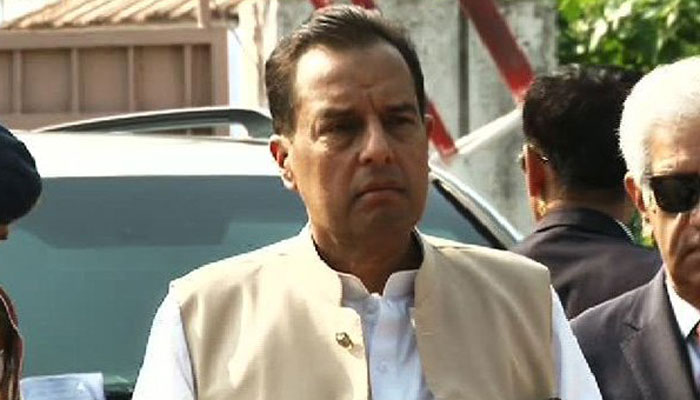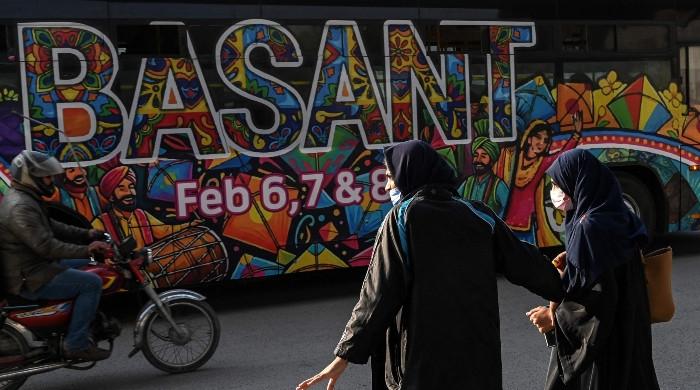Captain Aladin and religious minorities
How can the great captain prove himself Rustam-e-Pakistan by targeting one of the most marginalised minorities?
October 16, 2017

We know that religion is the last refuge of a scoundrel. However, we did not know that our national son-in-law, Captain (r) Safdar, was so keen to join the league of scoundrels and he would be looking for a refuge so soon after coming under fire. National sons-in-law are often an embarrassment anywhere in the world. In Pakistan, they are a huge liability and we have good reasons to worry about them. The leadership of our political parties can be transferred to national daughters, and national sons-in-law can get a chance to play havoc with these institutions, harming us all in the process.
Commentators are trying to analyse motives of Captain Sahab’s emotional rant against a beleaguered religious minority and I don’t want to be left behind. Like everyone else, I admire him for his good luck but also find reasons to feel sympathy for him. He is a street urchin married to a princess. That should make him a hero. Unfortunately, he can be a hero only in a Disney animation, and even those animations end at the marriage ceremony in the palace. They don’t take us to the middle age of the princes, princesses and street urchins.
Life in a palace can be psychologically challenging for such a son-in-law. Waking up to chandeliers, high walls and an army of servants serving nihari can be quite daunting. You may end up asking yourself if you were delivered there due to some malfunction in the GPS of the stork that delivered you belatedly on the rooftop of the palace. You must try and prove that you have something in you that make you deserving of this place.
It is better to bask in borrowed glory than occupy an unmarked grave after living a life of anonymity. All of us know that and all of us would be more than happy to exchange our destinies with an Aladin. But that is also the prefect recipe for evincing the jealousy of millions of those who are still looking for a lamp in the winding alleys of Baghdad. After all, we are jealous of people who are like us, not of those with whom we can’t identify.
As if Aladin Zardari was not enough, this nation has to contend with Captain Aladin as well. How can the great captain prove himself Rustam-e-Pakistan by targeting one of the most marginalised minorities? The answer is simple: the way Modi has proved himself Rustam-e-Hind, the way Donald Trump has proved himself Rustam-e-America and the way Aung San Suu Kyi has become the liberator of Myanmar.
It is no longer about minorities – not by a long shot. Minorities are facing all kind of threats in so many countries, ranging from harassment to persecution and ethnic cleansing. In my opinion, the threat to majorities themselves is even bigger; their humanity is at risk. Can there be a bigger threat to a human group?
Let me quote a Myanmar-based BBC reporter: “There has been a steady campaign to dehumanise these people (Rohingya). Some Buddhist monks were referring to them as insects and snakes and vermin that needed to be eradicated. The language used to describe Rohingya people was very similar to the language used to describe [the] Tutsi during Rwanda genocide and in other cases where people were dehumanised by the governments…”
The perfect human behaviour of the Myanmar military is also described in the same report through the story of a twenty-year-old thin and shy woman named Rajuma: “Government troops came to her village, burnt down their houses one by one, separated men from women, executed all of the men and began gang raping all women. If any woman had a child in her arms, the soldier then ripped the child from the woman’s arms and threw them into fires.” According to the report, most of Rajuman’s family members were killed while she escaped from fire naked and covered in blood.
Why can’t the Buddhists monks see which of the two groups has been denuded of humanity and is acting like snakes and vermin? To borrow the Buddha’s own words, while they are pointing one finger at Rohingya, their own four fingers at pointing at themselves. Carl Jung has elaborated on this in many of his writings. According to Jung, we often see our own reflection, our own darker self, in our designated enemy. He calls it the process of projection. In his opinion, Nazis’ description of Jews during the Nazi era was actually their own description.
Thinkers of the enlightenment era believed that technology and science would make us more rational and this enhanced rationality would result in humanism. Unfortunately, science is amoral. Technology, in fact, gives us the means to do as much damage as we like – to ourselves and to others. It is only deeper wisdom that can guard us from becoming hostages to our own devils.
Religion itself is the greatest repository of such wisdom. How many of my readers know that Iqbal called Ram, the Hindu deity, Imam-e-Hind or he wrote a poem celebrating the life of Guru Nanak or wrote poems for other non-Muslim religious figures? Do any of us question Iqbal being one of the greatest Muslims born on this soil?
Let me add some more insult to this injury. Part of the family of Iqbal’s older brother Sheikh Atta Mohammad had belonged to the Ahmadi community. It was this Atta Mohamamd who paid for Iqbal’s education and Iqbal tried to repay his debt by supporting his family. And, in my opinion, Iqbal’s religious views towards the Ahmadis were no different from those prevalent today.
A community of faith is a moral community first and foremost. It is nothing if it does not uphold those sacred values on which its identity is based. Rather than upholding moral values, religious politics is turning religions into warring tribes, leaving no hope of redemption for those who belong to the other tribe. This tribalism is defined by two questions: Who is part of the tribe and how to deal with those who are not part of the tribe? This tribalism is emerging as a huge threat to humanity. It is turning democracy into majoritarianism, putting the greatest system of human organisations at risk.
The reaction of the Pakistani military to this senseless burst should make us all proud. The DG ISPR asserted that Pakistan’s military is a national military and it has followers of all faiths in its fold. However, there is a need to mainstream this ethos to the public space, which is getting sectarianised by the day.
We have seen a rising trend of using accusations of apostasy and blasphemy against politicians and human rights activists. The PML-N has also been targeted by fatwas after taking a centrist position and trying to defend minorities. The establishment must use its influence to give a shut up call to those online aalims who vomit religious bigotry and hatred nonstop. We have not seen much pro-activism from the courts on this regard either.
The PML-N must realise that such captains are completely unable to steer our ship through stormy waters. Their place is the orlop deck, the lower deck in the ship, not anywhere near the helm.
The writer is an anthropologist and development professional. Email: [email protected], Twitter: @zaighamkhan
Originally published in The News











